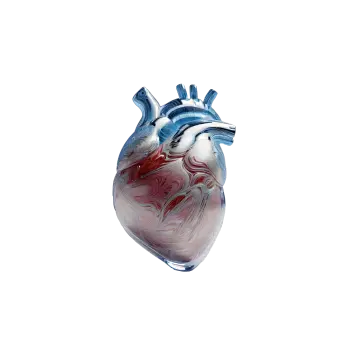What is myocarditis?
Myocarditis, also known as myocarditis, is an inflammation of the heart muscle that can affect the heart's ability to pump blood effectively. The inflammation is most often caused by viral infections, but can also occur as a result of bacteria, autoimmune diseases, or certain medications. The condition can range from mild symptoms to serious complications such as heart failure or heart rhythm disorders.
Causes of myocarditis
Myocarditis can occur for several reasons, with viral infections being the most common. Here are the main reasons why the inflammation develops.
- Viral infections: Most common cause, such as enterovirus (coxsackievirus), influenza virus or COVID-19.
- Bacterial infections: For example, streptococci or borreliosis (in Lyme disease).
- Autoimmune diseases: Rheumatoid arthritis or lupus can cause myocarditis.
- Drugs and toxins: Some medications or alcohol can affect the heart muscle.
- Vaccinations: Myocarditis has been reported rarely after vaccination, especially in young men.
Symptoms of myocarditis
The symptoms of myocarditis can vary depending on how much of the heart is affected. Common signs of heart muscle inflammation are listed below.
- Chest pain: Similar to a heart attack, often a sharp or pressing feeling in the chest.
- Shortness of breath: Especially with physical exertion or at rest in more severe cases.
- Fatigue: Noticeable lack of energy that is out of proportion to activity.
- Palpitation: Sensation of a fast, irregular heartbeat.
- Dizziness or fainting: Signs of impaired blood flow from the heart.
- Fever and muscle aches: Common with concurrent infection.
When should you seek medical attention?
It is important to seek medical attention if you suspect myocarditis, especially if you experience any of the following.
- In case of persistent chest pain that does not go away at rest.
- If you have difficulty breathing or swelling in your legs.
- In case of palpitations or fainting.
- After an infection if you have new heart symptoms.
Diagnosis and blood tests for myocarditis
The diagnosis is made using symptoms, heart examinations and blood tests.
- ECG: Can show rhythm disturbances or signs of inflammation.
- Blood tests: Troponin T, CRP and BNP are used to assess heart damage and inflammation.
- Ultrasound of the heart: Assesses the heart's pumping function.
- MRI of the heart: Used to confirm inflammation of the heart muscle.
Treatment of heart muscle inflammation
Treatment depends on the cause and how severe the inflammation is. Here are common treatment methods.
- Rest: Physical rest is important to reduce the strain on the heart.
- Anti-inflammatory treatment: In some cases, medications that reduce inflammation can be given.
- Treatment of the underlying cause: Antibiotics for bacterial infection, antiviral agents in some cases.
- Heart failure treatment: In cases of reduced pumping ability, heart medications may be needed.
Frequently asked questions about myocarditis
Here we answer the most common questions about myocarditis, what it feels like, how you get it, and what you should look out for if you have any suspicious symptoms.
How does Myocarditis feel?
Myocarditis often feels like chest pain, pressure, or discomfort, similar to a heart attack. Many people also experience fatigue, palpitations, and shortness of breath, especially with exertion.
How do you get myocarditis?
The most common cause is viral infections, but you can also get myocarditis from bacteria, autoimmune reactions, or certain medications. The infection spreads from the body to the heart.
What is myocarditis?
Myocarditis is an inflammation of the heart muscle that affects the heart's ability to work normally. It can cause symptoms such as chest pain, fatigue and palpitations and, in severe cases, can lead to heart failure.
How do you know if you have myocarditis?
If you have had an infection and then develop chest pain, fatigue or shortness of breath, you should seek medical attention. Your doctor can diagnose the condition through an ECG, blood tests (such as troponin) and sometimes an MRI scan.
How does myocarditis start?
It often starts with an infection, such as a cold or flu. After a few days or weeks, symptoms from the heart may occur, such as chest pain, palpitations or fatigue. Myocarditis often feels like chest pain, pressure or discomfort, similar to a heart attack. Many people also experience fatigue, palpitations and shortness of breath, especially with exertion.
How do you get myocarditis?
The most common cause is viral infections, but you can also get myocarditis from bacteria, autoimmune reactions or certain medications. The infection spreads from the body to the heart.
How do you know if you have myocarditis?
If you have had an infection and then develop chest pain, fatigue or shortness of breath, you should seek medical attention. Your doctor can diagnose the condition through an EKG, blood tests (such as troponin) and sometimes an MRI scan.
How does myocarditis start?
It often starts with an infection, such as a cold or flu. After a few days or weeks, symptoms from the heart may occur, such as chest pain, palpitations or fatigue.





















